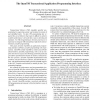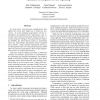23589 search results - page 4595 / 4718 » Uncheatable Distributed Computations |
117
Voted
IEEEPACT
2007
IEEE
15 years 9 months ago
2007
IEEE
Transactional Memory (TM) simplifies parallel programming by supporting atomic and isolated execution of user-identified tasks. To date, TM programming has required the use of l...
123
Voted
IEEEPACT
2007
IEEE
15 years 9 months ago
2007
IEEE
Multi-core processors naturally exploit thread-level parallelism (TLP). However, extracting instruction-level parallelism (ILP) from individual applications or threads is still a ...
133
Voted
IEEEPACT
2007
IEEE
15 years 9 months ago
2007
IEEE
With the advent of chip-multiprocessors, we are faced with the challenge of parallelizing performance-critical software. Transactional memory (TM) has emerged as a promising progr...
107
Voted
IEEEPACT
2007
IEEE
15 years 9 months ago
2007
IEEE
In recent years, microprocessor manufacturers have shifted their focus from single-core to multi-core processors. To avoid burdening programmers with the responsibility of paralle...
131
Voted
IEEEPACT
2007
IEEE
15 years 9 months ago
2007
IEEE
Effective use of communication networks is critical to the performance and scalability of parallel applications. Partitioned Global Address Space languages like UPC bring the pro...


